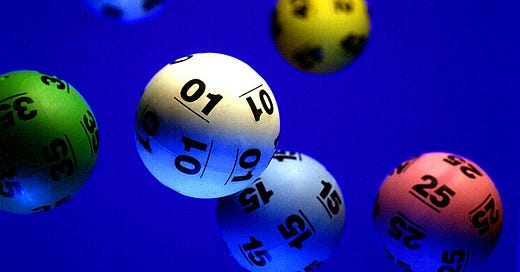Intro
So we discussed the rough maxima one can make investing in the prior article, as 20-30% annualised per year. For those not happy with such numbers and wanting to make more, let’s explore another popular wealth creation method. The Lottery.
Turns out 7 in 10 play National Lottery games in the UK (see page 10) and participation is high in other countries too (e.g. 50% of the USA) so this should be a useful article for many. We’ll focus on the UK national lottery, though the principles/payout ratios are similar in other jurisdictions.
So the main question we’re going to answer is - where does your £2 lotto ticket go? Does say, 80% go back to players in prizes? Let’s find out.
Where does the money go?
Based on Companies House data (see note 1), I can actually tell you in pretty simple terms the answer to this question. Whilst this data is aggregated across all lotteries they run (e.g. Lotto, Thunderball, EuroMillions etc). The most popular is Lotto, thus I’ll model it based off buying a typical £2 ticket (e.g. if 22% of The National Lottery’s revenue went to charity, we can assume £0.44 of your £2 lotto ticket went to charity). So I have created a pie chart showing where your £2 ticket goes. Might surprise some.
Note 1: This analysis is based on Camelot’s Annual Report published in Nov 2023 (the last full calendar year of trading for them, as the lottery is now run by Allwyn Entertainment. That said, the model/underlying mathematics are unlikely to change significantly under new ownership).
Only 57% goes to you
What this means is if you spend £2 on a ticket, your expected payoff is only £1.14 (£2 * 57% prize fund). Thus over the long run, you’re guaranteed to lose 86p/43% per ticket. Now some people may rush to the defence of this corporation (labourers defending capitalists, I know ironic) by saying they give you a chance to win a life changing sum, and it has done so for 6,800 people since inception.
So let’s look at the odds of winning a life changing sum. To do this we’re going to do a simple expected payoff calculation (e.g. if you have a 1 in 10 chance of winning £2, your expected payoff is 20p)

What you can see, is your chance of winning £1m is 1 in 7.5 million. For perspective, your odds of being killed by a shark is 1 in 3.7 million. And for the jackpot of several million, you’re talking 1 in 45 million. Again for perspective, you’ve probably got the same chance as becoming prime minister as you have winning the jackpot (approx. 45 million people are aged 18 or over in the UK).
Given that 7/10 people play because the prizes are big, I imagine straight after this article gets published lottery ticket purchases will fall 70% (assuming human beings are rational, not a massive ask).
Practical Application
If you want to become rich, don’t play the lottery. Because even if you do win, you’ve got about a 1/3 chance of going bankrupt (I suspect because school teaches you how to be a labourer, not how to be a capitalist and run money like this blog). So in the next article I’ll cover Equity Mathematics, to see if it offers a better chance of wealth creation.
Hope you found this useful
Chris






